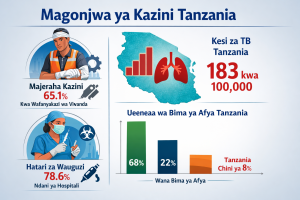
Empowering African Content Creators in the AfCFTA Era: Nurturing Innovation and Income Generation
The untapped social circles
The African Continental Free Trade Area (AfCFTA) heralds a new era of economic opportunity and collaboration across the African continent. The framework promises to create a single market of about 13 billion Africans and a combined GDP of US$3.4 trillion that member states are seeking to tap into. Underlined in the agreement is the push for tapping into the growing digital economy in the continent, particularly in the need to harness the power of content creation and sharing on social media platforms. As member states seek to harness the potential of this landmark agreement, it’s crucial to recognize the central role that content creators play in shaping modern economies. However, debates on the monetization of content in Africa points towards the lack of a clear framework for revenue generation from a platform such as Facebook, X, YouTube, and Instagram.
One of the benefits of the practical implementation of the AfCFTA framework is enhanced job creation in a country with a burgeoning youth population. It therefore raises questions on the lack of content monetarization in Africa considering that only 12 of the 55 African nations access this ad generation features especially on YouTube as a job creation mechanism. This is considering that the top 10 highest-grossing content creators are not Africans where the least earned US$17.5 million in 2023. This raises questions on the preparedness of the AfCFTA and member states to harness the power of social media and enhance wealth and revenue generation through content creation.
The digital age has given rise to a vibrant ecosystem of content platforms like YouTube, Spotify, TikTok, and Twitter, providing an avenue for creative expression and income generation. Put into perspective, Nigerian social media users average 3.44 hours spent on social media, the highest in Africa while Kenyans spend at least 3.32 hours online in the first quarter of 2023. This illustrates a potentially vast market that guided policies and frameworks under the AfCFTA would enhance job creation in the continent. The proliferation of digital platforms has thus democratized content creation, allowing individuals from all corners of the continent to share their stories, talents, and perspectives with a global audience. African content creators have harnessed platforms like YouTube to build communities, share knowledge, and even launch businesses. From fashion and music to comedy and educational content, the diversity of offerings reflects Africa’s rich cultural tapestry. However, despite the undeniable potential, many creators still face challenges in terms of monetization, copyright protection, and equitable access to digital infrastructure. To fully leverage the AfCFTA’s potential, member states must develop forward-thinking policies that empower content creators, foster innovation, and unlock the economic benefits of the digital revolution.
Platforms for Income Generation
Individual nations, in their implementation efforts for the AfCFTA framework, ought to champion investment in digital skills training programs to ensure that African content creators possess the technical knowledge required to produce high-quality content and navigate the digital landscape to compete globally. This calls for increased collaboration between the private sector, learning institutions, and African governments in capacity building for budding content creators across emerging platforms. However, it is not lost on the individual nations that the current youthful population excelled at the use of social media with the leading three nations spending an average of 3 hours each on social media per user every day. AfCFTA member states must therefore collaborate with digital platforms to create effective mechanisms for facilitating the monetization of content. This could take the form of developing positive-sum models for revenue sharing, direct funding opportunities, and grants for creators and digital platforms.
The problem of intellectual property rights is a major impediment to content protection with the ease of replication and sharing on social media. National and AfCFTA laws on intellectual property rights must be accompanied by human and technological innovation while being harmonized with international and regional treaties to enhance content creator protection. This will ensure that the landscape of content creation in Africa is backed by robust copyright laws and enforcement mechanisms that are essential in protecting creators’ intellectual property. It is therefore incumbent that member states work together to harmonize copyright regulations and swiftly address violations to benefit creators across the continent and support wealth creation under AfCFTA’s protocol on digital trade.

While content creation can often attract minimal capital requirements with significant requirements for skills and knowledge endowment among creators, funding can be a challenge. Working with stakeholders such as the private sector and learning institutions, establishing dedicated funds or venture capital initiatives can provide content creators with the financial support needed to scale their operations and create sustainable businesses. Moreover, member states can encourage the growth of local content-sharing platforms, providing creators with alternatives to global giants while nurturing a sense of cultural ownership and identity. Thus, this calls for collaboration in creating to create mentorship programs, networking events, and industry partnerships that empower content creators to thrive.
Promoting Cross-Border Collaboration
One of the AfCFTA’s main goals is to promote intra-African trade and collaboration. The framework can therefore tap into the position of content creators to contribute to this goal considering that social media and their work transcends geographical borders. Based on knowledge transfer, the simplification of visa and travel regulations can enable content creators to participate in collaborative projects amplifying their influence on digital platforms and meeting in person to exchange ideas. Moreover, the appreciation for digital platforms under the AfCFTA ought to factor in support for virtual collaboration platforms and networking events to enhance connections and idea-sharing across member states a capacity-building element. Moreover, in awareness creation for the AfCFTA platform as it gears towards starting full-scale operations, consideration for cultural exchange initiatives that encourage creators from different regions to collaborate, fostering cross-cultural understanding and innovation would further enhance room for content creation. Tapping to creatives as an element of championing the framework adoption and awareness while establishing digital hubs or platforms where content creators can share best practices, resources, and insights, leading to the mutual growth of the community should be a priority. Notably, to achieve these goals, the AfCFTA secretariat to ensure that language barriers do not hinder collaboration by promoting multilingualism and translation services, creating an inclusive environment for creators from diverse linguistic backgrounds.
“The simplification of visa and travel regulations can enable content creators to participate in collaborative projects amplifying their influence on digital platforms and meeting in person to exchange ideas.”
Policy Framework for the Digital Content Ecosystem
As the digital content landscape evolves rapidly, member states need a comprehensive policy framework to support content creation as part of the AfCFTA protocol on digital trade. Digital infrastructure such as internet access, speeds, and penetration out to be prioritized to ensure that creators participate by bridging the existing digital divide. With concerns about human rights violations, nations need to develop clear regulations that balance freedom of expression with accountability, ensuring that content adheres to ethical and legal standards. This will protect creators from legal and other implications by focusing on ethical content generation. Considering the revenue generation potential, countries will further need to acknowledge the unique income streams of content creators while contributing to national revenue which requires fair taxation policies. While data protection regulations safeguard creators’ personal and financial information from misuse, more collaboration between governments, private sector players, and content creators’ associations can help co-create policies that reflect the needs and aspirations of the community.
The AfCFTA presents an unprecedented opportunity for member states to harness the potential of the digital content revolution, empowering content creators, and driving economic growth. By adopting proactive policies that prioritize digital skills, copyright protection, income generation, cross-border collaboration, and a conducive policy framework, member states can unlock the immense potential of content creators to shape a vibrant and economically prosperous Africa. As the digital landscape continues to evolve, fostering an environment of innovation, inclusivity, and empowerment will be essential in realizing the AfCFTA’s promise and positioning Africa at the forefront of the global digital economy.
Muoki Musila is an Kenyan based economist. He is the communications and marketing associate at Liberty Sparks. These are the writer’s own opinions and do not necessarily reflect the viewpoints of Liberty Sparks. Do you want to publish in this space? Contact our editors at [email protected] for further clarification.



